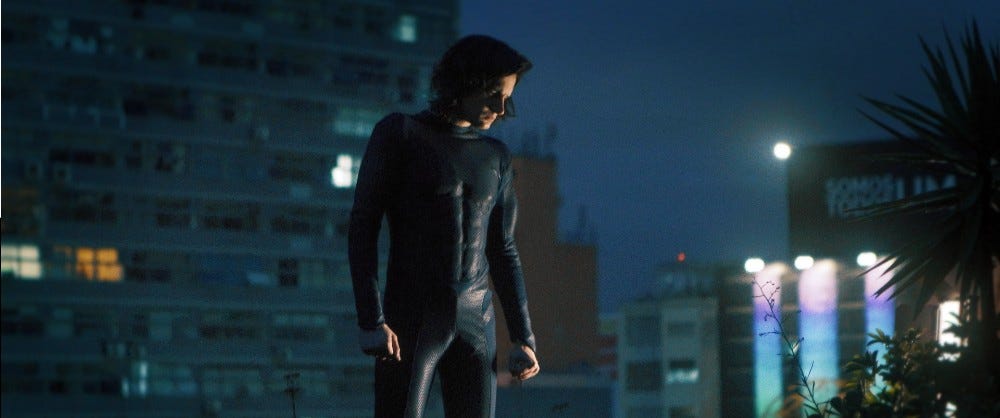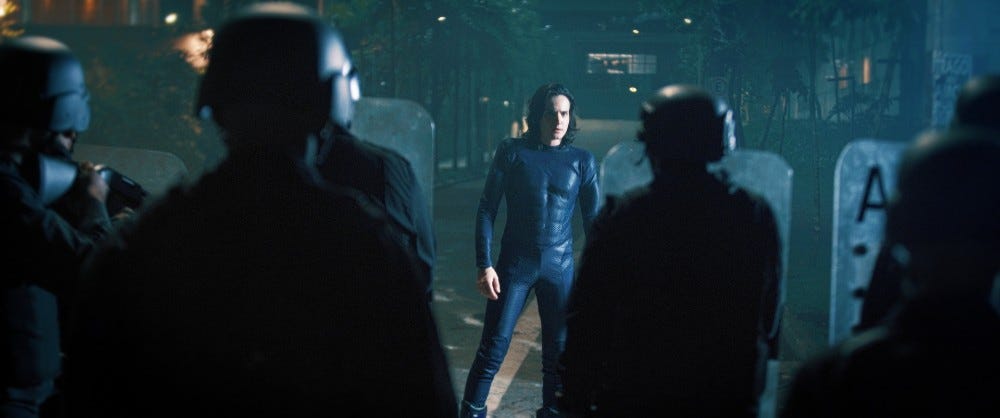WARDEN REVIEW
“There are certainly some interesting thoughts and ideas, but the movie is somewhat hobbled by not having the money to deliver enough of a satisfying visual experience”
Superheroes continue to be bigger than ever, and depending on who you speak to, we’re either in a boom for the genre or on the precipice of superhero movies becoming the bane of moviegoers’ existence. Maybe we’ve already gone beyond that precipice, but we’ve long ago learned that one doesn’t need to be a Marvel or even a DC to give superheroes a go. Movies like Chronicle and Brightburn are two relatively recent examples of movies that have attempted to put a spin on superheroes. You’d probably end up with an even longer list if you were to discuss how comics themselves have tried to reinvent superheroes – some (like The Boys) have made their way into other media – but it’s something that’s been done to death, mostly when Alan Moore decided to reinvent the superhero with early efforts like Miracleman and Watchmen, both important pieces in the puzzle that is Warden.
Directed by multi-hyphenate Marcus Alqueres, who also produced and shot the film from a screenplay by Jeff Juhasz, Warden is a lower-budget look at superheroes that takes quite a different approach, not just because it’s set in Brazil, but because it deals with political corruption in that country head on. Set in a city called Nova São Paulo, the film uses a series of testimonials and interviews to introduce us to Daniel Dias (Giovanni de Lorenzi), a young man who develops superpowers to fight crime as the city’s protector, and who is quickly dubbed “Warden.” It doesn’t take long for government officials and wealthy individuals to realize that even a superhero can easily be bought, and corruption begins to twist Warden’s morals and ethics, to make him turn a blind eye to certain crimes.
Having had family in Brazil for many decades, I’m more than well aware of the political corruption that’s pervasive in that country even if it’s been decades since the military government seen in Walter Salles’ recent Oscar winner, I’m Still Here. I wouldn’t be surprised if the filmmakers behind Warden are Brazilian themselves, nor would I be surprised by an interest in superheroes, since Brazil has long been the home of CCXP, a comic book and media convention that’s grown to rival San Diego Comic-Con. It would be an easy through-line to understand why Brazilian filmmakers might want to play in that sandbox themselves.
In the case of Danny Dias, Warden follows a similar origin path of other comic book heroes who become corrupted by their own power, particularly another Alan Moore putting a twist on the Golden Age British hero Marvelman to show how having absolute power can corrupt even the most noble of heroes. (Marvelman’s name was later changed to Miracleman for the same reasons why “Shazam” is no longer called “Captain Marvel,” though ironically, Marvel ended up publishing Miracleman stories in recent years.) What impressed me most about this film’s script is that it takes a far more in-depth look into the idea of real world superheroes, handling that subject more in a documentary format than something like M. Night Shyamalan’s Unbreakable, which at the time, really pissed me off as a long-time comics reader about how simply it handled the idea of superheroes vs. villains.
Even so, Warden would have worked infinitely better if de Lorenzi had far more charisma as Warden. He doesn’t even look particularly heroic with his long mane of hair and a poorly-fitting costume that looks fairly bargain-basement, even considering that the young man wearing it probably designed it himself. A bigger problem is that when we do see Warden in action, it often involves some of the most primitive visual effects you can imagine, which is something that really holds it back. Much of Warden focuses on various parties talking about Warden and his history, but making a movie like this as something so based in talking heads tends to bog it down and make it harder to stay invested, going against a well-known ethos that it’s often better to “show, don’t tell.”
That aside, Alqueres is a filmmaker who clearly has some talent, being able to put together a film like this on a presumably low budget, and finding a cast to deliver realistic testimonials that make us think we’re watching true experts on the subject of Brazilian politics and superheroics. It this same story were set in an American or European location, it was likely to be far less interesting or relevant, and it might not have worked at all.
There are certainly some interesting thoughts and ideas in Warden, and it’s a shame that the movie is somewhat hobbled by not having the money to deliver enough of a satisfying visual experience when it comes to showing Warden in action.
Rating: 5.5/10
Warden is now available on various VOD platforms.






